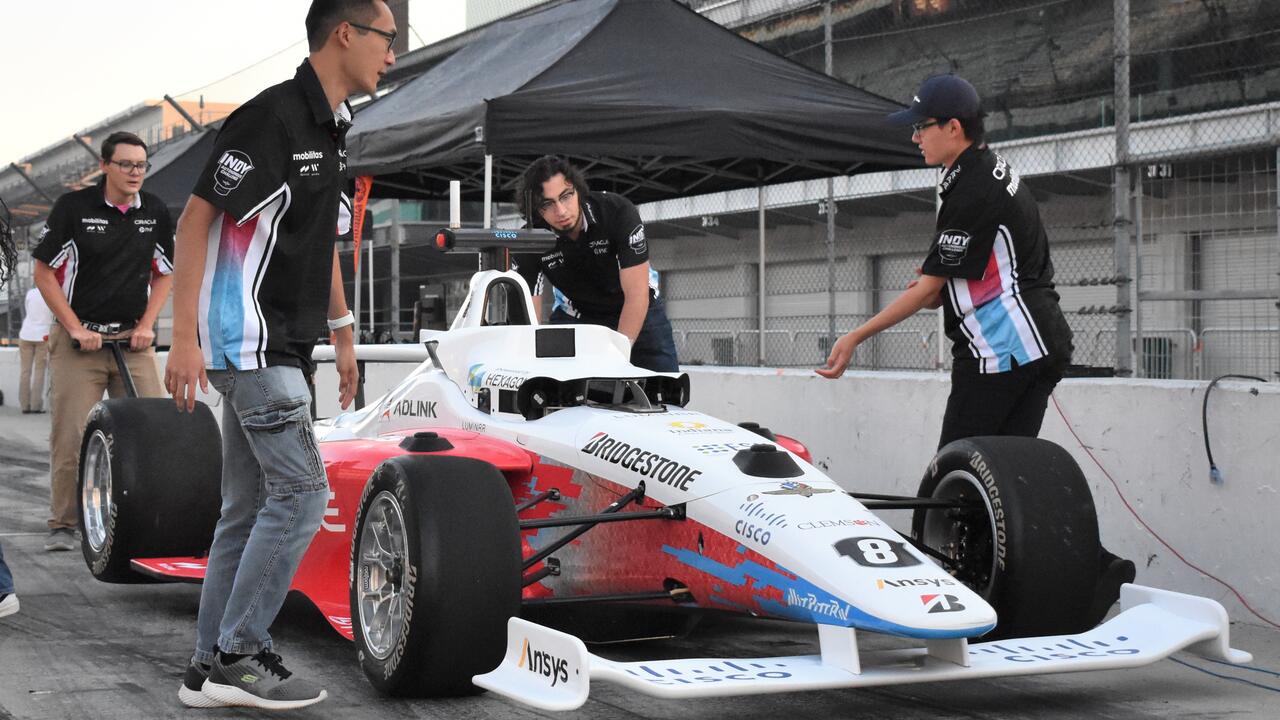
Waterloo students to race autonomous vehicles at Indy speedway
Racecar Waterloo students helped to develop will drive itself around Indianapolis Motor Speedway at up to 120 miles per hour

Racecar Waterloo students helped to develop will drive itself around Indianapolis Motor Speedway at up to 120 miles per hour
By Media RelationsTwo students at the University of Waterloo expect to be part of history this weekend when an autonomous, million-dollar racecar they helped develop drives itself around the famed Indianapolis Motor Speedway at speeds of up to 120 miles per hour.
Brian Mao and Ben Zhang are members of a four-university team set to compete with rivals from around the world for a US $1-million top prize at the Indy Autonomous Challenge on Saturday.
“This is something nobody else has done before – take autonomous vehicles up to those kinds of speeds,” said Mao, a master’s student in applied mathematics. “There are a lot of unsolved problems that have to be tackled.”
Ten teams representing 21 universities will put modified Dallara AV-21 racecars through their paces at Indy, the largest sports venue in the world, as the culmination of a competition that included several simulated races.
Students from nine countries have been working since 2019 to program driverless cars equipped with the latest sensory equipment so they are capable of negotiating the track on their own at high speeds. Waterloo is the sole Canadian school involved.
“The only control we have is an emergency button,” said Zhang, a master’s student in electrical and computer engineering.
Mao (BASc ’20, mechanical engineering) and Zhang (BCS ’20, computer science) have been in Indianapolis for about six weeks, working full-time to integrate software developed by their team into the actual racecar.
“Honestly, it’s amazing just seeing it in person,” Mao said of the stadium. “The track is so big that after the first turn, we won’t even be able to see our car. We have to watch it on several monitors.”
Waterloo initially had a team of its own called WATORACE, but joined forces with the Massachusetts Institute of Technology, the University of Pittsburgh and the Rochester Institute of Technology to pool resources and expertise due to the complexity of the project.
The core of the Waterloo contingent, a subgroup of student design team WATonomous, also includes software engineering undergraduate Kyle Anderson, computer science undergraduate Ryan Larkin and Rollen D’Souza, a PhD student in electrical and computer engineering.
Mao, 23, of Newmarket and Zhang, 24, of Vancouver will be part of a six-person pit crew for their car when the final race – the details of which are still being worked out by organizers – is staged. It was one of just four that didn’t crash in the final simulated race in June.
“We are confident it will go around the track at high speed,” said Zhang. “We have tested it multiple times. What we’re still a bit unsure of is its obstacle avoidance manoeuvre.”
Organized by Energy Systems Network and the Indianapolis Motor Speedway, and backed by a long list of sponsors, the event is meant to advance technology for the commercialization of autonomous vehicles and advanced driver-assistance systems.
Waterloo’s joint team backed off its original goal of a 180-mph top speed to improve safety and complete the race unscathed.
“We’re both nervous and excited at the same time because we’ve put in so much time and care so much about this,” Mao said. “We really want to make sure we don’t crash the car.”

Read more
Here are the people and events behind some of this year’s most compelling Waterloo stories

Read more
Meet five exceptional Waterloo graduate students crossing the convocation stage as Class of 2025 valedictorians

Read more
Twenty-six researchers receive federal funding to drive discovery, innovation and research infrastructure development
The University of Waterloo acknowledges that much of our work takes place on the traditional territory of the Neutral, Anishinaabeg, and Haudenosaunee peoples. Our main campus is situated on the Haldimand Tract, the land granted to the Six Nations that includes six miles on each side of the Grand River. Our active work toward reconciliation takes place across our campuses through research, learning, teaching, and community building, and is co-ordinated within the Office of Indigenous Relations.